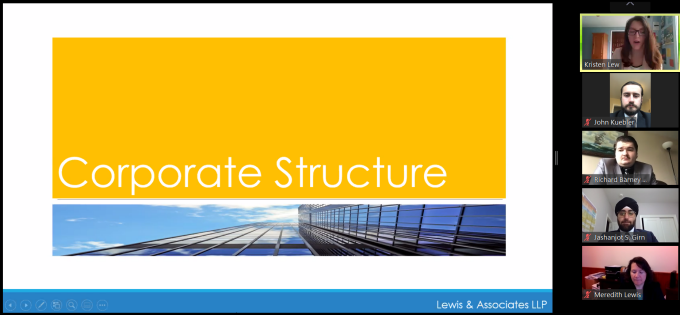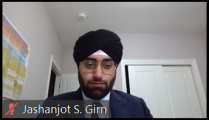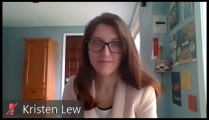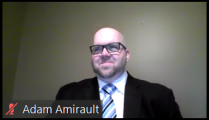
Kristen Lew ’20 presents advice via Zoom to a fictitious corporate client.
Global Citizens: Developing an international perspective
One of UB School of Law’s signature strengths is giving students a working sense of law’s global connections. Nowhere is that more evident than in the school’s Cross-Border Legal Studies concentration – and no one better demonstrates it than the students in the concentration’s capstone course.
Professor Meredith Kolsky Lewis’ class, with five students this past semester, is a high-intensity exercise in what it’s like to advise a client on cross-border legal issues. “The class is designed both to expose students to the nature and range of cross-border legal work, and to impart skills relevant to legal work broadly, particularly in law firms and other private practice settings,” Lewis says. “As such, I hope the students, regardless of their future practice areas, will take away a better understanding of how to write for different audiences (internal supervisors, existing external clients and potential future clients); how to present and conduct themselves professionally; and the range of ways new lawyers can start establishing themselves and begin to work on client development.”
The class met regularly with attorneys engaged in cross-border legal work, including lawyers from Buffalo-area firms Hodgson Russ LLP, Phillips Lytle LLP and Berardi Immigration Law, as well as with UB Associate Vice Provost for Immigration Services Oscar Budde. Lewis says, “I’m so grateful to all the attorneys who took the time to meet with us this semester to discuss their different areas of cross-border legal practice. The class was able to interact with lawyers doing immigration, corporate, tax, environmental, trusts and estates, international trade, and trade sanctions and compliance work.”
Over the semester, Phillips Lytle and Hodgson Russ assisted Lewis with developing a range of assignments, and also provided students with feedback on aspects of their work. Each student completed two mock client alerts directed toward prospective law firm clients, and a series of assignments relating to a scenario in which a fictitious Canadian client is looking to expand into the U.S. market. In their final group presentation, held this year via Zoom, the class summarized their advice to the fictitious client on topics such as tax implications, national security regulations, corporate structure, and mergers and acquisitions. Many attorneys from Phillips Lytle and Hodgson Russ attended, and asked questions of the students and provided feedback after the presentation as well.
This year’s capstone class included two Canadian students, which isn’t unusual. “Having international students in the class is always refreshing and enlightening,” Lewis says. “The topics we address have broad application outside the U.S.-Canada context and are relevant to cross-border situations generally. We are of course on the U.S.-Canada border, and it’s wonderful to have both American and Canadian students in the class, as well as, in some years, other nationalities.”
Conversations with a few of the students found them grateful for the exposure to this growing area of law, and closer than ever to graduating as practice-ready attorneys.
“It’s a great practical experience, and these kinds of things you don’t learn in any other class,” says Jashanjot Girn ’20, one of the Canadian students. “In addition to the final memo, we had to come up with solutions for the business, as well as marketing pieces like client alerts – what’s happening in legal news and how law firms can help businesses. It helped you gain experience to see what kinds of work you would be doing if you were in that field.”
Much of Girn’s work involved looking at the tax consequences of the client firm’s actions. “I took a very basic federal tax class in my second year,” he says, “and I had to research a whole section of the tax code that I wasn’t familiar with and write a 20-page brief on it.” It helped that he could seek guidance from his assigned practicing attorneys. “The attorneys were great,” he says. “We could email them anytime, and they always responded.”
His classmate Kristen Lew ’20 mostly worked on mergers and acquisitions aspects of the client company’s situation. “It’s a rare opportunity to be able to get feedback from lawyers in the community,” she says. “We were back and forth with them the whole time. And because it was such a small class, we were able to work together and have a lot of individual attention.
“Even if I’m not practicing in that area going forward, it was good to see the expectations you’re going to be facing in practice. It’s a very different environment than in the classroom.”
Adam Amirault ’21, who is Canadian, worked in financial services and higher education before coming to UB School of Law. In the capstone course, he focused a lot on national security concerns for the fictitious client – putting in, he said, close to 100 hours of work on his part of the final presentation.
The response to the Zoom presentation, he says, was spot-on: “If any of us had weaknesses in our presentation, they would say, ‘Oh, did you think about …’ and gently walk us back to where they thought we went wrong.”
He says he also appreciated the course’s focus on the business of law: “You have to be aware that a firm is a business, that billable hours are a requirement, that you have to somehow get business through the door,” he says. “It gives you a lot more context for what the practice of law is going to be like.”


